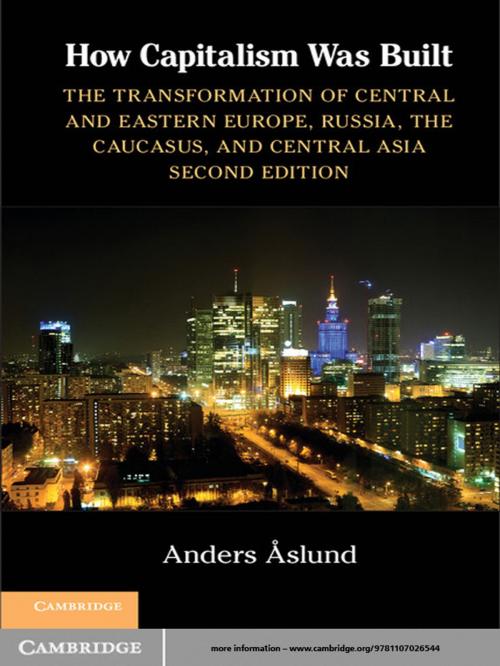How Capitalism Was Built
The Transformation of Central and Eastern Europe, Russia, the Caucasus, and Central Asia
Business & Finance, Economics, Economic Development, International| Author: | Anders Aslund | ISBN: | 9781139794275 |
| Publisher: | Cambridge University Press | Publication: | November 12, 2012 |
| Imprint: | Cambridge University Press | Language: | English |
| Author: | Anders Aslund |
| ISBN: | 9781139794275 |
| Publisher: | Cambridge University Press |
| Publication: | November 12, 2012 |
| Imprint: | Cambridge University Press |
| Language: | English |
Anders Aslund is known to make bold predictions that initially arouse controversy but soon become common wisdom. In Gorbachev's Struggle for Economic Reform (1989), he foresaw the collapse of the Soviet political and economic system. After Russia's financial crisis of 1998, observers declared the market economic experiment a failure, Aslund foresaw market economic success (Building Capitalism, 2002). In How Capitalism Was Built, 2nd Edition, he asks - and answers for the twenty-one countries he investigates: • Why did communism collapse? • Why did Russia not choose gradual reforms like China did? • Wherein lies the relative success of postcommunist transformation? • How did the oligarchs arise and decline vis-à-vis authoritarian leaders? Anyone who wants to understand the often confusing postcommunist dramas and obtain an early insight into the future will find this intellectually stimulating book useful. This edition includes updates to each chapter and new chapters on the impact of the global financial crisis and the European Union.
Anders Aslund is known to make bold predictions that initially arouse controversy but soon become common wisdom. In Gorbachev's Struggle for Economic Reform (1989), he foresaw the collapse of the Soviet political and economic system. After Russia's financial crisis of 1998, observers declared the market economic experiment a failure, Aslund foresaw market economic success (Building Capitalism, 2002). In How Capitalism Was Built, 2nd Edition, he asks - and answers for the twenty-one countries he investigates: • Why did communism collapse? • Why did Russia not choose gradual reforms like China did? • Wherein lies the relative success of postcommunist transformation? • How did the oligarchs arise and decline vis-à-vis authoritarian leaders? Anyone who wants to understand the often confusing postcommunist dramas and obtain an early insight into the future will find this intellectually stimulating book useful. This edition includes updates to each chapter and new chapters on the impact of the global financial crisis and the European Union.















